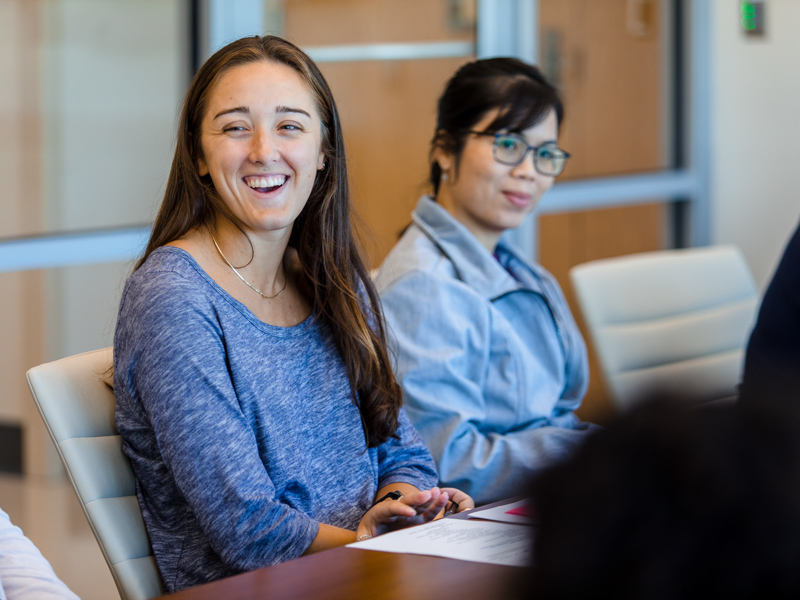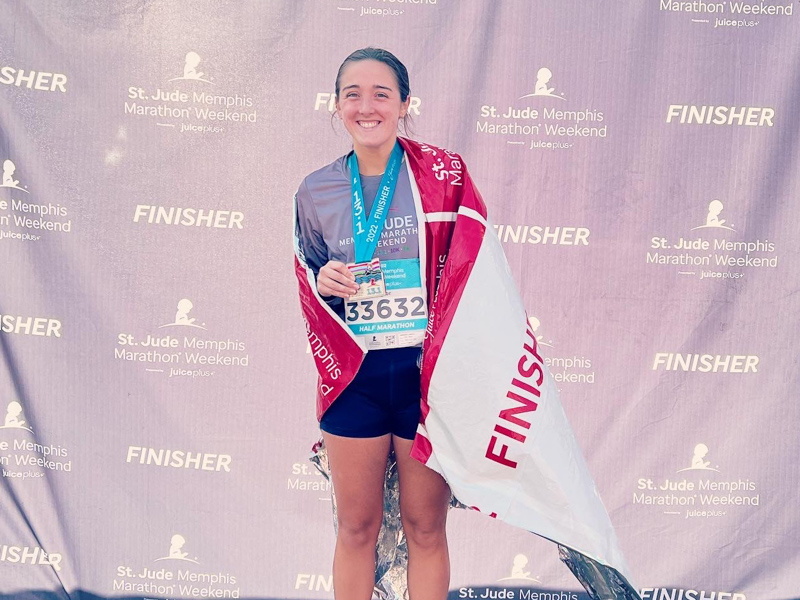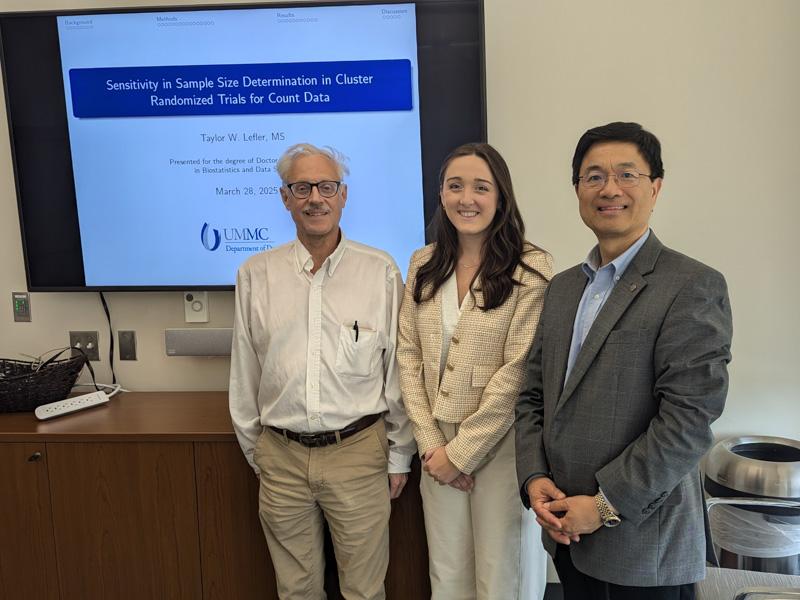#2025UMMCGrad: Love of games, puzzles lead to student’s future career

As a child, Taylor Lefler loved solving puzzles and playing games. She enjoyed working out problems, creating a strategy. Using logic and reason for positive outcomes.
Now, as a PhD biostatistics and data science student with UMMC’s School of Population Health, Lefler, 26, is applying the same principles to bigger puzzles that need to be solved. “I’ve always loved math,” she said. “I loved problem solving and working some sort of puzzle or game. And my dad is a civil engineer, and my mom was an accounting teacher in business studies. So, it just came naturally to me.”
A native of Ripley, Lefler went on to earn a bachelor’s degree in mathematics summa cum laude at Mississippi State University. Then she continued her studies, earning a master’s degree in biostatistics and data science from UMMC. Now, she continues her love of the whole process of solving a problem.
“I still like board and card games. We love hosting game nights at our house,” she said. “As a child, I loved the Phase 10 card game. It was good for rainy days playing with my family. Now I also attend trivia events. I like winning in any game of course, although I have to say my husband is more competitive.”
Another way Lefler is competitive is as a runner. She did not win a ribbon at a recent half-marathon. It’s more about the challenge – the accomplishment -- for her than the win.

“I love running,” she said. “I usually do four or five days of running a week. The distance depends on what I’m training for. For a 5K or 10K, or even for a half or full marathon, I trying to build up my distance with a longer run on Saturdays, gradually increasing how far I run.”
Running and hiking analogies come quick to her in her research, as well, thanks to her former professor, Dr. Philip Turk, who now works in Ohio. He has maintained contact with Lefler and supported her throughout her studies. He was an advisor on her dissertation committee, and he’ll be flying in for her commencement.
“He taught me that just as in running, you have to keep a certain pace mile for mile, not let training – or research – lapse too long. If I set things aside for too long, I lose track of where I left off and end up having to backtrack. Like running, it’s about being consistent,” Lefler said.
Research in population health allows Lefler to use her math and research skills in a broader way. “I want to make an impact on a larger scale and beyond,” she said. “Many people in Mississippi face significant health care needs.”

Lefler’s dissertation work focused on a clinical trial often used for community-based public health research. She helped develop a methodology to address real-world challenges for sample size determination for this specific clinical trial design.
During her time at the FDA, her work supported improved access to pharmaceutical products for patients in need. Taylor served as a graduate research assistant for the Mississippi Center for Clinical and Translational Research and completed a two-year ORISE fellowship in the Office of Surveillance and Epidemiology at the FDA remotely.
“Internships and fellowships allow graduate students to practice and get experience in their specific area of research,” Lefler said. “I worked in the Office of Surveillance and Epidemiology, and the research there helped me develop robust expertise in public health and real-world evidence.”
Since the early 1990s, ORISE epidemiologists have concentrated on building and maintaining worker health registries to support medical surveillance, health risk assessments and morbidity studies. Within the process of doing research, Lefler worked with some of the nation’s brightest pharmacists, physicians and epidemiologists aiming to improve public health.
“The fellowship was more application based in terms of the bio stats realm, and we used real-world evidence to support and improve access to medications and treatments for patient needs,” Lefler said.
“My work focused on opioid crisis, and we used nationwide prescription claims data to study trends in the use of medication to treat opioid use disorder.”
Lefler’s parents are excited about her studies and research trajectory. “They love learning about what I do,” she said with a smile, “and they will proudly be at my graduation.”
And Lefler’s not waiting on the ink to dry on her degree. She’s already moved to Atlanta and is interviewing for research positions.
Dr. Jeannette Simino, chair of data science and program director for the Biostatistics & Data Science Program at SOPH, had the pleasure of teaching Lefler and observing her research.
“Taylor is a superstar,” Simino said. “She excelled in all facets of our program, even completing the ORISE program at the FDA. For the past two years, Taylor conducted applied statistical work in the Office of Surveillance and Epidemiology at the FDA while simultaneously completing theoretical dissertation research on sample size determination in clustered randomized trails for count data. She has been exceptionally productive and has contributed to at least eight manuscripts, three as a first-time author.”
According to Simino, Lefler’s outstanding body of dissertation work was selected for oral presentation at the two most prestigious American Statistical Association meetings, helping to increase the national visibility of the program. “Taylor’s work will inform the population health responses to gun violence and opioid use disorder, as well as influence cluster randomized trials planning for the foreseeable future. Even with all her research accolades, Taylor exhibits the heart of a servant,” Simino said. “She served as the president of the School of Population Health Student Body, a health policy fellow, and a social health volunteer at the Jackson Free Clinic. She represents an ideal for other biostatistics and data sciences PhD graduates to aspire to.”
Dr. William Hillegass, professor of data science, served as Lefler’s research advisor and dissertation co-chair with Turk. "At every step of this process, I have been aware and most impressed with her ability and effort," Hillegass said. “But I must admit, I was taken as whole in reflection, by the corpus of her work and achievements at the School of Population Health. It is really astounding.”
Hillegass added that Lefler “has been an extraordinarily able, motivated, pioneering and productive graduate student and community member.
“In our still relatively nascent biostatistics and data science graduate program, Taylor has become the ideal role model. I suspect Taylor’s steady approach, unassuming demeanor, quiet work ethic and level of achievement will permanently further elevate the expectations and culture of our program. Fellow graduate students and faculty alike view her as having redefined what is ideally possible during graduate school at the Bower School of Population Health.”
Another puzzle Leffler solved was that of love. She recently married Gaven Lefler, a mechanical engineer who she knew her in high school and also studied at MSU.


